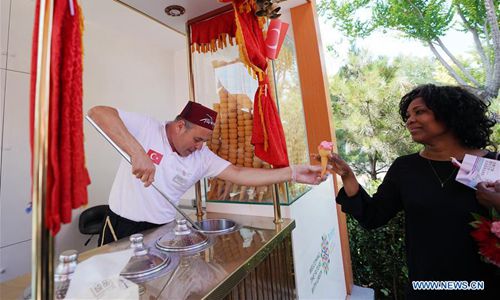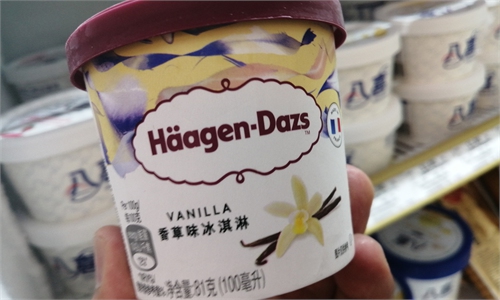
A visitor (R) tries Turkish ice cream at the Beijing International Horticultural Exhibition in Beijing, capital of China, July 3, 2019. The "Turkey Day" event kicked off here on Wednesday. (Photo:Xinhua)
A variety of Turkish ice creams of all kinds and colors, including but not limited to sorbets and snacks, have tickled the taste buds of Chinese consumers.
Neville Ceasar, CEO of MADO China, is now busy discussing new collaborations after his Turkish ice cream booth lured many investors and distributors at the China International Import Expo (CIIE) held in Shanghai earlier in November.
As a famous Turkish brand of ice cream, MADO also offers coffee, drinks, desserts, and baked products, making the brand a chain restaurant trademark.
MADO opened its first offline store in Guangzhou, the capital of south China's Guangdong province, as early as in 2017.
Since then, the company has continued its exploration journey in the Chinese market, and now owns six offline stores in different Chinese cities, such as Yiwu, a "world supermarket."
"I hope MADO is not only a restaurant, but also a place for relaxation, business negotiations, and a location of friend gatherings," Neville told his goal.
CIIE has provided him with a broad platform to enter the Chinese market as well as attract more potential business partners.
Neville participated in the first CIIE in 2018. He believed the event, a national platform gathering foreign business people from all over the world, is the most important expo in China.
"If foreign companies intend to enter the Chinese market, they should attend this exhibition to display their products and strength, which is also a communication channel between business people and Chinese government officials," Neville said.
Neville said that they have made the ice cream for Chinese consumers less sweet than that in Turkey, and also introduced rice-flavored ice cream to China, which was Chinese favorite staple food.
Xinhua

